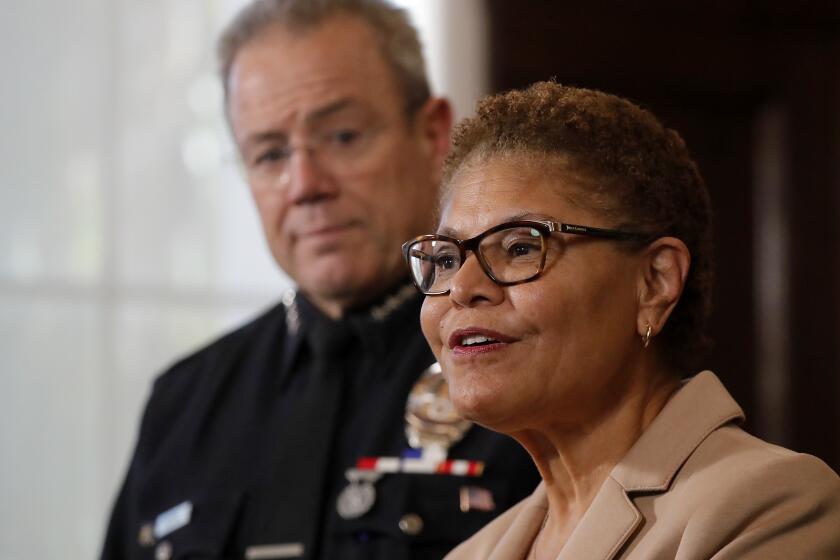Editorial: L.A.’s next police chief must be able to recognize — and squash — crime trends quickly

- Share via
Crime trends in Los Angeles tend to begin quickly and spin out of control before being eclipsed by the next criminal phenomenon. In recent years the city has been beset by waves of catalytic converter thefts from parked cars, smash-and-grab robberies at high-end stores, shoplifting at big-box and mom-and-pop retail outlets, “burglary tourism” heists allegedly committed by visitors from South America, and stripping of streetlights for copper wire, among other crimes.
The city needs a police department that is nimble enough to rapidly identify and snuff out these trends. It must have sufficient investigative resources, an ear to the ground in the criminal underworld, and a well-established line of communication with other cities and agencies to stop crimes from becoming trends in the first place.
In her first few months as mayor, it seemed as if Karen Bass were a bystander when it came to the LAPD. But her actions and comments since show that she was in charge all along and deftly putting pieces in place for a change in leadership.
And crucially, it needs a leader with the vision, skill and persuasive power to redirect officers who too often are focused on fighting crime trends with decades-old approaches and by rolling back hard-won reforms — for example misdemeanor status for drug possession and elimination of money bail for most misdemeanor arrests in Los Angeles County.
That’s something Mayor Karen Bass and the Board of Police Commissioners should keep top of mind as they move toward selecting a new chief for the Los Angeles Police Department later this year. Chief Dominic Choi is serving in an interim capacity between the departure earlier this year of Chief Michel Moore and the selection and installation of a new chief to a five-year term.
The LAPD chief said Friday afternoon that he will step down next month. This is the right move, and gives the mayor an opportunity to reshape public safety in Los Angeles
Though others are involved in vetting applicants, ultimately the choice is the mayor’s, and she is appropriately steering the process. Improving and redirecting the police department is her most important job, along with the related priority of reducing homelessness. Bass is well-suited for this task; she has devoted much of her career as an organizer and as an elected official to reforming police.
Any checklist she may have for her new chief will surely include a plan for addressing a spate of police killings and other uses of force, a perpetual challenge in L.A. as in most large cities. It will include, as it should, an ability to work with mental health professionals and peers on ways to deal with suspects who appear to have psychiatric or substance-use problems. It should include an ability to command respect from, and communicate with, officers and the public.
Since she vetoed the first proposal, L.A. Mayor Karen Bass should help develop a more comprehensive reform package. It’s important to get police reform right because the City Council has bamboozled the public before.
But it should also include a desire that the next police chief have a plan for quickly responding to crime trends that come at an ever-quickening pace that is more than just agitating to return to failed criminal justice policies.
The LAPD has a mixed record on up-to-date response and sometimes seems stuck in the past. For example, Moore complained repeatedly that eliminating money bail for some crimes results in accused car thieves being arrested, released and arrested again for the same crime multiple times within days. But the problem was never eliminating money bail. It was a separate issue: unconditionally releasing suspects who have demonstrated a propensity to re-offend. Law enforcement can hold a suspect until arraignment even in the absence of money bail.
LAPD officers have also wrongly complained that the criminal justice reform measure from 2014, Proposition 47, decriminalized shoplifting and drug use, so they have no power to combat those problems. But that’s incorrect; the ballot measure did no such thing, and police response, including arrest where appropriate, is still needed.
In the case of copper wire theft, the LAPD joined with other city departments to investigate and stop the thieves, with promising results. This shows that the department is fully capable of quick response.
A good chief will steer the department to those kinds of solutions, working with federal and foreign authorities to track and deny entry to burglary tourists, with automakers to secure catalytic converters and with online sellers to stop the fencing of stolen retail goods. A good chief will remind officers that misdemeanors remain crimes, subject to arrest, and that criminal justice reforms that reduce recidivism or provide non-jail solutions to crime problems enhance, rather than undermine, law enforcement.
Such an approach to public safety requires a strong forward-thinking chief who understands that making police more effective and public safety more collaborative is the best path forward.
More to Read
A cure for the common opinion
Get thought-provoking perspectives with our weekly newsletter.
You may occasionally receive promotional content from the Los Angeles Times.













